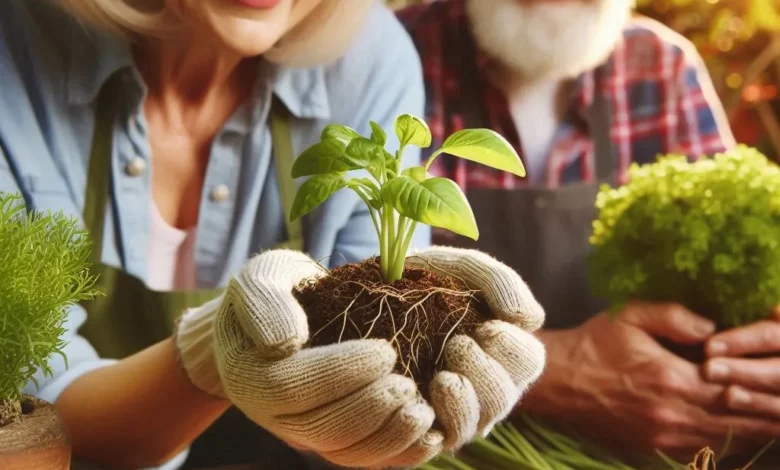Gardening for Seniors: Health Benefits and Tips

Have you ever wondered why your grandparents seem so content when tending to their garden? It turns out that gardening isn’t just a pleasant pastime – it’s a powerful tool for healthy aging. This hobby offers a unique blend of physical activity, mental stimulation, and social connection that can significantly improve the lives of older adults.
Imagine a single activity that can help you stay fit, keep your mind sharp, and connect with others. That’s exactly what gardening does! Whether you’re planting colorful flowers or growing juicy tomatoes, you’re nurturing your health along with your plants.
The Physical Benefits of Gardening for Seniors
A Natural Workout
Gardening is like a gentle gym session in your backyard. It involves a range of movements that keep your body active without putting too much strain on your joints. Here’s what gardening can do for your physical health:
- Improve flexibility: Reaching for plants and bending to tend to them helps keep your joints limber.
- Build strength: Digging, planting, and carrying watering cans work various muscle groups.
- Boost cardiovascular health: The continuous movement can get your heart pumping, potentially lowering blood pressure and reducing the risk of heart disease.
Soaking Up the Sunshine
When you garden outdoors, you’re also soaking up vitamin D from the sun. This vital nutrient helps your body absorb calcium, keeping your bones strong. Just remember to wear sunscreen and a hat to protect your skin!
Mental Health Advantages of Gardening
A Natural Stress-Buster
Have you ever noticed how calm you feel after spending time in nature? Gardening harnesses this calming power of the outdoors. The act of nurturing plants can significantly reduce stress and promote relaxation.
Keeping Your Mind Sharp
Gardening isn’t just about physical work – it’s a mental workout too. Planning your garden layout, solving problems like pest control, and learning about different plants all help to keep your brain active and engaged.
Growing a Sense of Purpose
There’s something incredibly fulfilling about watching a seed you’ve planted grow into a beautiful flower or a delicious vegetable. This sense of achievement can boost your mood and give you a real sense of purpose.
A Natural Mood-Lifter
Gardening has shown potential in reducing symptoms of depression and anxiety. In fact, horticultural therapy is now used in many mental health treatment programs. The combination of physical activity, exposure to nature, and the satisfaction of nurturing living things can have a powerful positive impact on mental health.
Social Benefits of Gardening for Older Adults
Community Gardens: More Than Just Plants
Community gardens are like social hubs with leaves and petals. They offer a unique space where seniors can:
- Meet new people with shared interests
- Exchange gardening tips and tricks
- Work together towards a common goal
These interactions can help combat loneliness and isolation, which are often challenges for older adults.
Sharing the Fruits of Your Labor
Growing your own produce isn’t just rewarding – it’s an excellent way to connect with neighbors. Imagine the joy of sharing a basket of home-grown tomatoes or a bouquet of fresh flowers with those around you. It’s a simple act that can spark conversations and strengthen community bonds.
Bridging Generations Through Gardening
Gardening offers a wonderful opportunity for intergenerational connections. Here are some ways seniors can involve younger family members:
- Teach grandchildren about different plants and how they grow
- Plan and plant a “pizza garden” with herbs and vegetables for toppings
- Create a butterfly garden to observe nature together
- Have a sunflower growing competition
These activities not only create lasting memories but also pass down valuable knowledge and skills to younger generations.
Nutrition and Diet Improvements
Farm-to-Table, Straight from Your Backyard
One of the most tangible benefits of gardening is the access to fresh, organic produce. When you grow your own fruits and vegetables, you know exactly what goes into them – no mysterious pesticides or chemicals. This control over your food source can lead to a healthier diet.
Expanding Your Palate
Growing your own food can encourage you to try new varieties of fruits and vegetables. This naturally leads to a more varied and nutritious diet. You might discover a love for heirloom tomatoes or find that homegrown kale tastes much better than store-bought!
The Joy of Eating What You’ve Grown
There’s something special about eating food you’ve grown yourself. As one senior gardener, Martha, puts it:
“The taste of a carrot I’ve nurtured from a tiny seed is incomparable. It’s not just food; it’s an achievement, a reward for my patience and care.”
This connection to your food can make meals more satisfying and enjoyable, potentially leading to better eating habits.
A Natural Path to Healthier Eating
When you invest time and effort into growing vegetables, you’re more likely to incorporate them into your meals. This can naturally shift your diet towards more plant-based, nutrient-rich foods, which is beneficial for overall health and longevity.
Getting Started: Tips for Senior Gardeners
Choosing the Right Plants for Beginners
Starting a garden can feel overwhelming, but with the right plants, it can be a breeze. Here’s a list of easy-to-grow vegetables and flowers perfect for beginner gardeners:
- Vegetables:
- Tomatoes
- Lettuce
- Radishes
- Green beans
- Zucchini
- Flowers:
- Marigolds
- Sunflowers
- Pansies
- Petunias
- Geraniums
These plants are generally low-maintenance and offer quick, rewarding results.
Ergonomic Tools and Adaptive Gardening Techniques
Gardening-friendly tools can make a world of difference for seniors. Here’s a comparison of regular gardening tools with their adaptive versions:
| Regular Tool | Adaptive Version | Benefits |
|---|---|---|
| Hand trowel | Ergonomic trowel with curved handle | Reduces wrist strain |
| Pruning shears | Ratchet pruners | Requires less hand strength |
| Watering can | Lightweight, two-handled can | Easier to lift and pour |
| Kneeling pad | Garden kneeler with handles | Provides support for getting up and down |
Container Gardening for Limited Spaces
Don’t have a large yard? No problem! Container gardening is an excellent option for seniors with limited space. You can grow herbs on a windowsill, vegetables in pots on a balcony, or flowers in hanging baskets. This approach also reduces the need for bending and kneeling.
Safety Considerations
While gardening is generally safe, it’s important to take some precautions:
- Sun protection: Wear a wide-brimmed hat and apply sunscreen
- Stay hydrated: Keep a water bottle nearby and take regular breaks
- Avoid overexertion: Listen to your body and rest when needed
- Wear gloves: Protect your hands from cuts and soil-borne bacteria
- Use proper lifting techniques: Bend at the knees, not the waist, when lifting heavy items
Overcoming Challenges in Senior Gardening
Working Around Physical Limitations
Gardening can be adapted to suit various physical abilities. If standing for long periods is difficult, try sitting gardening. Use a comfortable chair and place your plants on a table or raised bed at arm’s level.
Gardening with Reduced Mobility
For those with mobility issues, consider these options:
- Raised beds: Elevate your garden to reduce bending and kneeling
- Vertical gardening: Grow plants upwards using trellises or wall-mounted planters
- Tabletop gardens: Create mini gardens on tables or sturdy surfaces
Dealing with Weather Extremes
Extreme weather doesn’t have to stop your gardening efforts:
- In hot weather, garden during cooler morning or evening hours
- Use shade cloths to protect plants (and yourself) from intense sun
- In cold weather, use cold frames or greenhouses to extend the growing season
- Bring potted plants indoors during frost
Senior-Friendly Pest Control Methods
Keeping pests at bay doesn’t have to involve harsh chemicals. Try these gentler methods:
- Companion planting (e.g., planting marigolds near vegetables to repel pests)
- Using physical barriers like row covers or netting
- Employing natural predators like ladybugs for aphid control
- Making homemade, non-toxic pest sprays with ingredients like soap and water
The Future of Gardening and Aging
Technology in the Garden
Gardening is going high-tech, making it easier and more accessible for seniors. Here are some innovations:
- Smart irrigation systems: These water your plants automatically, adjusting based on weather conditions.
- Gardening apps: Get plant care reminders, identify plants, and access gardening tips right from your smartphone.
- Soil sensors: Monitor soil moisture, temperature, and nutrients to ensure optimal growing conditions.
- Robot lawn mowers: Maintain your lawn without the physical strain of pushing a traditional mower.
These technologies can help seniors continue gardening even as physical tasks become more challenging.
Community Initiatives Supporting Senior Gardeners
Many communities are recognizing the value of gardening for older adults and are creating supportive programs:
- Senior-friendly community gardens: With raised beds and accessible pathways
- Gardening clubs: Offering social connections and shared knowledge
- Intergenerational gardening programs: Pairing seniors with youth for mutual learning
- Mobile gardens: Bringing gardening opportunities to seniors with limited mobility
These initiatives not only promote gardening but also foster community connections and support healthy aging.
Gardening as Part of Holistic Aging
Experts increasingly view gardening as a key component of healthy aging strategies. It’s being incorporated into:
- Retirement community designs
- Occupational therapy programs
- Mental health treatment plans
- Public health initiatives for older adults
As research continues to show the benefits of gardening for seniors, we can expect to see it play an even larger role in promoting health and well-being among older adults.
Conclusion
As we’ve explored throughout this article, gardening offers a wealth of benefits for seniors:
- Physical health: From improved flexibility to better cardiovascular health
- Mental well-being: Reducing stress and providing cognitive stimulation
- Social connections: Fostering community and intergenerational bonds
- Nutritional benefits: Access to fresh, home-grown produce
Whether you’re a seasoned gardener or considering picking up a trowel for the first time, it’s never too late to start reaping the rewards of this fulfilling hobby.
Remember, gardening isn’t just about cultivating plants – it’s about nurturing your own health and happiness. Each seed you plant is a step towards a more active, engaged, and joyful life.
So why not start your gardening journey today? Whether it’s a small herb garden on your windowsill or a plot in a community garden, you’re planting the seeds for a healthier, happier you. Your future self will thank you for the beautiful, blooming gift of gardening.
Happy planting!



